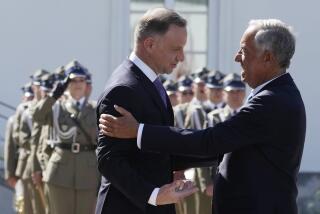Belgium Says Soviets Spurred Deployment
- Share via
BRUSSELS — Premier Wilfried Martens said Friday that Belgium will accept the first 16 U.S.-made nuclear cruise missiles because “the Soviet Union has continued its deployments of both (intermediate-range nuclear) SS-20 as well as . . . short-range missiles that also threaten Western Europe.”
Martens told Parliament that Foreign Minister Leo Tindemans, who was in Moscow this week for the funeral of Soviet President Konstantin U. Chernenko, talked for 45 minutes with his Soviet counterpart, Andrei A. Gromyko. Tindemans asked the Soviets not to let their opposition to President Reagan’s “Star Wars” defense initiative hinder progress in the medium-range nuclear negotiations in Geneva.
“The Soviet answer,” Martens said, “was that decoupling of the talks about medium-range missiles was impossible--given that the Soviet Union considers these weapons as strategic--and that an accompanying accord, in its eyes, must be reached on space weapons.
“Because of the (Soviet demand) of globalization (of the arms talks), one can expect long negotiations,” Martens said. “Under these circumstances, there is no longer any reason to retard the deployment of the first missiles.”
Washington Pleased
The White House welcomed Belgium’s announcement. “We applaud the steadfastness of the Belgian government in moving ahead with the decision to deploy,” spokesman Larry Speakes said. “The Belgian decision . . . demonstrates the resolve of the NATO allies and could help lead to fruitful arms negotiations.”
Predictably, the Soviet news agency Tass charged Friday that Belgium’s deployment decision was made despite public opposition.
In principle, Belgium has always backed the North Atlantic Treaty Organization’s 1979 decision to install 572 nuclear cruise and Pershing 2 missiles in five European nations. However, the Belgian government’s coalition partners are sensitive to strong anti-nuclear sentiments among some segments of the population.
Until now, therefore, the Cabinet has delayed a final decision on whether to take its share of the missiles. Now that it has accepted, the weapons will go to the Florennes air base, south of Brussels.
Belgium’s neighbor, the Netherlands, is scheduled to make a final deployment decision on its 48 cruise missiles by Nov. 1. NATO officials have always considered a Belgian go-ahead crucial to the decision in Holland, where anti-nuclear and anti-war sentiment is even more pronounced.
More to Read
Sign up for Essential California
The most important California stories and recommendations in your inbox every morning.
You may occasionally receive promotional content from the Los Angeles Times.












